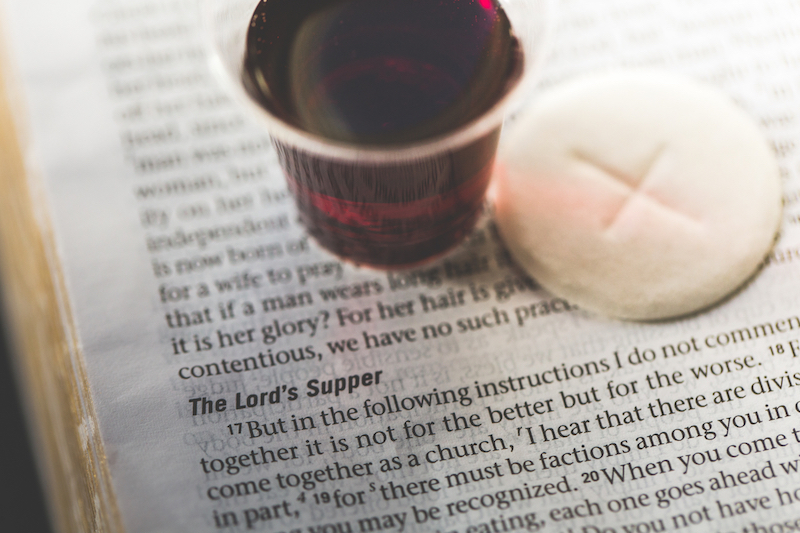Last week Pope Francis issued a new letter titled Amoris Laetitia (“The Joy of Love”). The apostolic exhortation addresses matters of sex and marriage—not only divorce but also, briefly, same-sex unions—and has garnered more than the usual amount of attention. Various news stories have spoken of an opening, a softening, a loosening of standards regarding objective criteria for entrance to the Lord’s Supper. And if you make it 200 pages in and peer at the footnotes, you will find this: “I would also point out that the Eucharist ‘is not a prize for the perfect, but a powerful medicine and nourishment for the weak’” (p. 237 fn. 351).

To assess its potential pastoral effect is difficult, not least because it is (as seems to be typical of Francis’s pontificate thus far) rather ambiguous about who may partake of the Eucharist and under what circumstances. In fact, it explicitly notes that while some might wish for clearer guidelines regarding care, honoring the goodness of God often requires suffering the vague for the sake of sharing God’s love.
It is not my place to speak to the internal politics and policies of the Roman Catholic Church, and I do not seek to address the question of divorced persons in particular. But I think it is worthwhile to take this opportunity to reflect as catholic and Reformed Christians upon a presupposition of this letter—indeed one that the letter may render more ambiguous. Why does receiving the Lord’s Supper require a particular moral posture? Why are we even discussing who is fit to receive a feast for sinners? These questions matter for all churches as we seek to be guided by scriptural teaching and to be pastorally faithful in caring for the women and men in our congregations. This question prompts us to think carefully about grace, repentance, and communion with God.
What Is the Supper For?
Some would argue that the Supper is a gift and means of grace, not merely a memorial of or visible prop for our own faith. They would admit that Christians need to repent of sin, to seek growth spiritually, and to walk more fittingly in the new life of Christ. Furthermore, as Augustinian Christians who realize that our indwelling sin renders us needy for help from the outside, they believe that the Supper is precisely what a sinner needs. If it is a means of grace, then who needs it more than the sinner struggling in their transgressions? To bar them from communion would be dangerous business. (Alan Jacobs has offered such a suggestion in a thoughtful manner.)
There is much to appreciate in such an argument. The Supper is a means of grace, and it is so precisely because we experience the presence of Jesus Christ in a unique way through it. But though it is a memorial meal and we do this “in remembrance of him,” the Supper is far more than a mere prop or parable. It is also a holy communion (the koinonia language in 1 Corinthians 10:16 is crucial here); for this reason, the Westminster Confession notes that we “do then also, inwardly by faith, really and indeed yet not carnally and corporally but spiritually, receive and feed upon, Christ crucified . . . the body and blood of Christ being then . . . really, but spiritually present to the faith of believers in that ordinance” (WCF 29.7). In addition, the anthropology that acknowledges our need for God’s grace in turning from sin is too easily overlooked in our day, so an Augustinian approach is a needful salve. We do need God’s life-giving grace from the outside; repentance for sin is not a human precondition to grace but itself also a fruit of grace.
But catholic and Reformed Christians continue to note that while these concerns are necessary to think well about our question they are not sufficient to answer it. Precisely because we do believe that Christ is present through the Supper (not in the elements themselves, as in the doctrine of transubstantiation, but through the partaking of them), we realize that approaching the table is a serious matter. This meeting with God can bring great blessing: assurance, peace, joy, and renewed vigor. But that is not all that this meal can bring.
We read Paul’s words that “many of you are weak and ill, and some have died,” as well as his explanation that “anyone who eats and drinks without discerning the body eats and drinks judgment on himself” (1 Cor. 11:29-30). As elsewhere in the Bible, the presence of God does not straightforwardly lead to blessing. For the unrepentant sinner, it leads to the experience of God’s curse (even in a New Testament church like Corinth). Again, understanding of the spiritual, real presence of Christ in the Supper makes it serious business. That’s Paul’s reasoning in 1 Corinthians 11.
Who Is the Supper For?
Reformed Christians would agree with Francis that the Supper is not a “prize for the perfect but powerful medicine and nourishment for the weak.” But the Supper is also for the repentant, not the unrepentant. One of the greatest proclamations of the gospel recaptured with reformational insights was the notion that the Supper is an occasion wherein God serves his people; thus, one of my favorite pastoral moments is the privilege of saying “The gifts of God for the people of God,” knowing that here is not an occasion where we provide for God (as in other religions) but where God offers himself so as to feed us. The Supper displays and even delivers the grace of Jesus. But this communion is for those who not only possess faith and desire to be with Christ but also “to depart from iniquity” and “bewail his unbelief” (WLC 172). For those who come as repentant sinners desirous of God’s aid and comfort this is an instrument through which one “may be further strengthened.” Grace leads to repentance, it is true, but the specific grace of the Supper is for those who are already repenting.
As we think about these things we do well to remember that others have considered the question before us. I am reminded of a reformer long ago who sought to reshape the pastoral theology of the church in his day and, in the course of that work, dealt with the question of whether the unrepentant should be admitted to the Supper. He noted that some were arguing that “this sacrament, like the others, is a spiritual medicine” and that “medicine is given to the sick for their recovery.” He saw the way in which this line of thinking might be suggested to fit with Jesus’s words that he came for the sick, not the healthy (Mt. 9:12). Yet he was struck by Paul’s warning in 1 Corinthians 11:29, and he noted that “any medicine whatever does not suit every stage of sickness.” With those words, Thomas Aquinas reminds us that we do well to remember that the Supper offers much, and we must remember not only the gracious presence offered therein but the gravity of approaching such glory (see Summa Theologiae, 3a.80.4).
While unrepentant sinners do need God’s grace to lead them to repentance, God does not design only one form of medicine. They need the medicine that leads unto repentance, though not unto perfection, victory, or sinlessness. As John Calvin said in his commentary on 1 Corinthians 11:28, “it is not perfect faith or repentance that is asked for.” And the Westminster Standards note that “this sacrament is appointed, for the relief even of weak and doubting Christians” (WLC 172)—before they can feast joyfully again in the presence of the Lord.
While unrepentant members of churches should be cared for pastorally, we have tools at our disposal and means of grace other than the sacrament of the Lord’s Supper.
Is there enough evidence for us to believe the Gospels?
 In an age of faith deconstruction and skepticism about the Bible’s authority, it’s common to hear claims that the Gospels are unreliable propaganda. And if the Gospels are shown to be historically unreliable, the whole foundation of Christianity begins to crumble.
In an age of faith deconstruction and skepticism about the Bible’s authority, it’s common to hear claims that the Gospels are unreliable propaganda. And if the Gospels are shown to be historically unreliable, the whole foundation of Christianity begins to crumble.


































